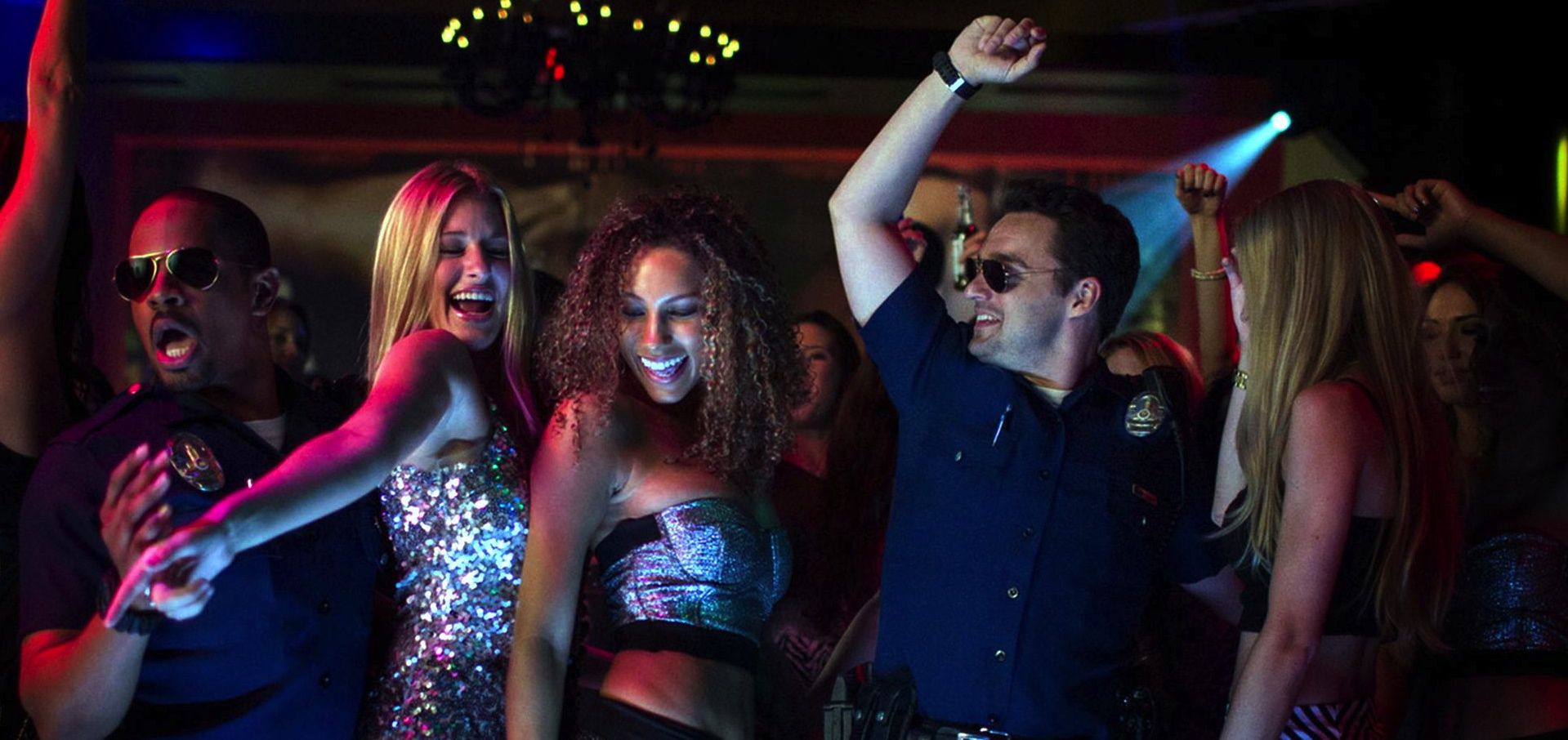
“That’s a bad option,” the man working at the cinema box office says as we pick up our tickets to Let’s Be Cops, with a candidness I’m sure his employer appreciates, “but not as bad an option as that other Wayans movie, White Chicks. That one stunk the whole place out!” Perhaps we differ on some aesthetic grounds (there’s something at the core of White Chicks that I don’t feel can be summarily dismissed), but I’d agree with him and thousands of others in saying that Let’s Be Cops isn’t great. Pans of these sorts of movies generally have a nice template that critics can use: strong premise/cast + flaws in execution + caveats of some redeeming features (usually an inspired supporting performance), before an overall snarky putdown as bottom line. Most of this applies, but I’d revert to the original starting point of how ill-conceived this project was.
Damon Wayans, Jr. and Jake Johnson co-star on New Girl, and there’s sufficient chemistry between them that could work in different, better movies. In Let’s Be Cops they play two thirty-something underachievers who, through a series of miscommunications, end up walking the streets of Los Angeles in police uniforms. That’s effectively the movie, and the rest of the film is Ryan (Johnson) getting caught up in the joke, and going to increasing lengths at playing cop (buying a second-hand police car, responding to house calls) whereas Justin (Wayans, Jr.) is the reluctant buddy who hesitates yet keeps getting convinced to go along. By the end, the film’s philosophy is tied up with its ideas of the personal failures of the two lead characters and their need of such a ruse to take control and responsibility in their own lives. But the problematically simplistic approach to “being cops” is the message a viewer will likely take home.
Much has been written already about how unfortunately timed the film is, coinciding with Ferguson, a point hammered home with its Australian release falling just one week before a Grand Jury decided to not press charges on Darren Wilson, the white police officer who gunned down unarmed black teen Michael Brown on August 9. But timing isn’t the problem here, it’s merely the element that shows how out of touch the film is – released well after Trayvon Martin’s death, you do wonder which of the Hollywood brass thought this was a movie that ought to be made. The premise that these two no-hopers gain esteem and social respect among the general public by putting on a uniform in 2014 feels tacky. But really, it’s an indictment of how tone-deaf this film is to race and its loaded, historical connection to law enforcement. The film goes to great lengths to avoid race – that the white Ryan is the failed athlete who had dreams of ‘going pro’ and black Justin is a video game designer seems like an obvious attempt at subverting stereotypes. Of course there’s something admirable in depicting minorities without cultural signifiers and baggage, but in a film about police abusing power it feels naïve at best. This film doesn’t set out to offend,1 but its of lesser ambition in that it sets out to be inoffensive, which feels worse, and could only have been made by people who aren’t in tune with the socio-political zeitgeist and who have never really faced persecution or abuse at the hands of law enforcement. This is a film that could have passed in the 1980s as a forgettable spoof of Lethal Weapon, 48 Hours and Tango & Cash, but in 2014 feels like the equivalent of an awkward relative making crass jokes at a wake.2
On less ideological grounds, the film is barely passable. Its stoner comedy first half feels at odds with its quite serious genre second half, as the two get caught up in operations with foreign gangsters, led by the laughably miscast James D’Arcy (!) as a pyschotic Albanian mob boss. I don’t hate the film; there are laughs to be had, and the film kicks up a notch with the appearance of Keegan-Michael Key in an aforementioned inspired supporting role, but it’s dull and generic in stretches over the back half. And it ticks off one of my pet peeves, which is mainstream culture’s terrible misunderstanding of video games; blissfully unaware of the intricacy and inspiration of indie game developers, and the impressive level of photorealism and depth in major titles. Pop culture consistently likes to show video game companies as having big lush offices that produce games that look like bad 1990s arcade shooters. It’s not as bad as Seth MacFarlane’s Dads in this regard, but it’s just another (far less problematic) instance of just how out of touch this film is. It’d piss a lot of people off if it weren’t so instantly forgettable.
